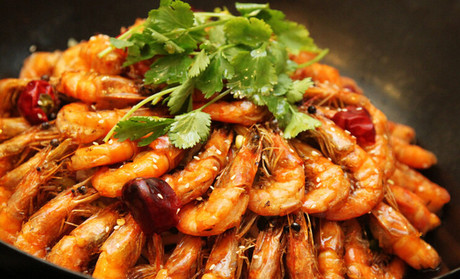Smells good!
好香!
The flavour Zhou Saiqun is talking about is the burnt flavour released in frying.
周赛群说的这种这香正是油炸彰显出的焦香。
Although more and more theories and tests are showing us the bad influence of overtaking oil and fat,
今天,无论再多理论申明油脂过量的危害,
the Chinese still cannot do without the crisp taste of fried food, just as people in Hunan cannot give up their strong-smelling bean curds.
中国人依然离不开那特有的脆爽口感,就像湖南人对臭豆腐的迷恋。
People are often impressed by the fragrance and hot taste of Hunan dishes.
湖南菜留给外地人的印象主要是“香”和“辣”

However, "hot" is not a term used to describe a flavour, but a strong stimulation brought by chilies to the mouth,
“辣”并不是味道,只是辣椒给口腔造成的强烈刺激,
while the fragrance mainly comes from the oils and fats, and also the chemical reaction between fats and proteins caused by heating.
而“香”则主要来自油脂以及油脂和蛋白质被热力催生出的化学反应。
Ancient Chinese found that oil could speed up the heating of food.
中国古人用油脂来对食材迅速加热。
It is undoubtedly a good idea to save fuels.
无疑是节省燃料的好方法。
The introduction of oil into cooking is one great contribution from the Chinese.
油脂的运用是中国人对烹饪的莫大贡献。
This is Zhou Saiqun's kitchen.
这就是周赛群的厨房。
Okay, the tail is ready now.
好,可以了,看,尾部。
If you are eager to make artistic dishes, but lack a gift for the arts, you may practice by imitating.
想要赋予菜品可观的卖相如果没有更多的美术天分就只有靠临摹。
Nevertheless, cooking skills cannot be mastered by watching only.
尽管如此,做菜是不可能看会的。
The course the Zhou is teaching now only lasts for two years.
这个班只有两年。
She must show her students as many of the popular dishes in today's restaurants as possible.
周赛群必须尽快把更多的市面流行菜品教给学生。
Therefore, her lessons are not limited to the Hunan Cuisine.
因此教授内容并不拘泥于湘菜。












